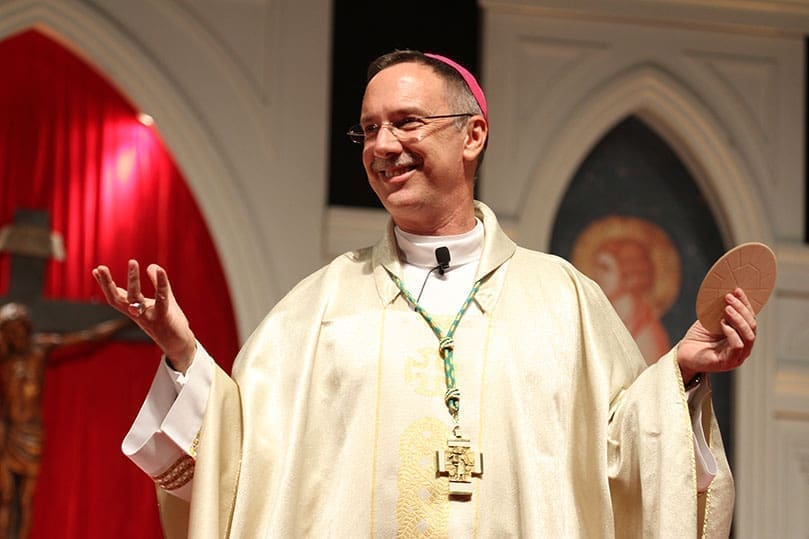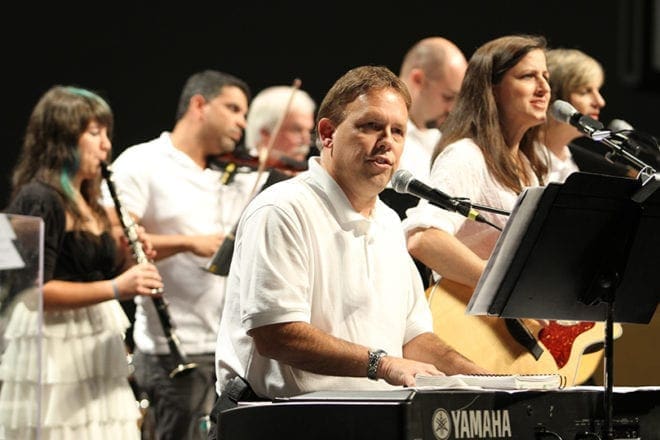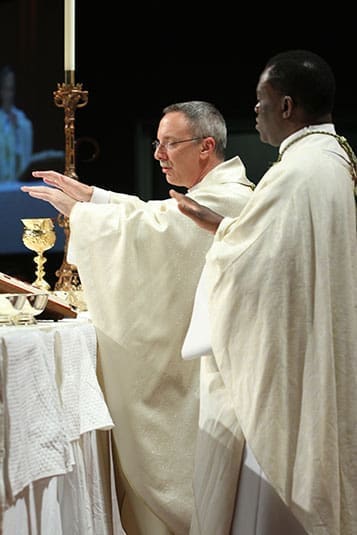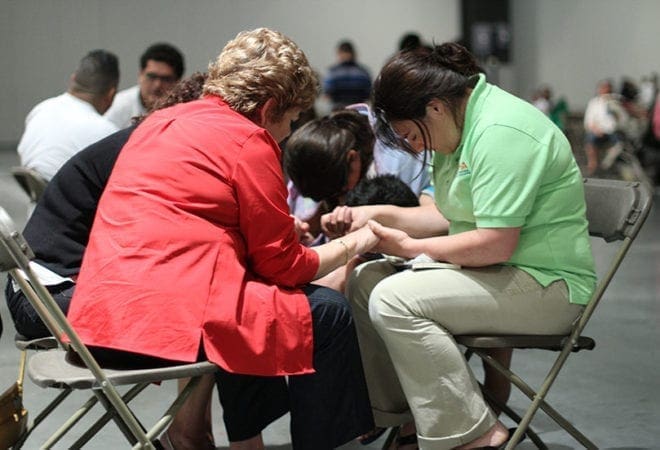 Photo By Michael Alexander
Photo By Michael AlexanderCollege Park
Seeing Beyond Appearances Begins At Mass, Bishop Says
By SUZANNE HAUGH, Special To The Bulletin | Published July 7, 2011
Smiles of familiarity, of appreciation, of hope and understanding—all kinds erupted on faces of congress-goers Friday evening, June 24, during the opening Mass and healing service for the 16th annual Eucharistic Congress entitled “The Harvest Is Abundant.”
Rightly so, for when people see beyond the appearance of simple bread to embrace the mystery of love that is the Eucharist, the telltale sign of recognition of this gift should be a smile, according to Auxiliary Bishop Luis R. Zarama, the main celebrant of the Mass held at the Georgia International Convention Center. He and those present found many reasons to smile during the liturgy and subsequent healing service led by Father Jack Durkin, pastor of St. Monica Church in Duluth.
Musicians from St. Mary Magdalene Church, Newnan, helped to create an atmosphere of worship.

St. Mary Magdalene Church choir director Paul Bauer plays the keyboard as musicians and vocalists sing in the background. The choir from Newnan provided the music for the opening Mass at the Eucharistic Congress, June 24. Photo By Michael Alexander
Moments before Mass began, Archbishop Wilton D. Gregory provided a warm welcome to begin the evening’s events, which included “Revive!“ for young adults, Portuguese and Francophone tracks. He recognized the presence of those from within and beyond the borders of the North Georgia archdiocese.
“Please ask the Lord … to bless once again this Eucharistic gathering with a fruitful outpouring of the Holy Spirit,” he said.
Recalling the night’s reading and connecting this year’s theme to the discernment of one’s vocation, Bishop Zarama recognized in his homily how, like St. John the Baptist, each person is called individually by name to grow in holiness.
One’s holiness, he said, corresponds to how able each person is to see beyond the consecrated host’s “simple appearance” as unleavened bread to the mystery of a love so profound that each person is known distinctly and is afforded the opportunity “to take the risk, that chance, with your own heart to be embraced and loved. And with that is freedom—freedom to become yourself.”
Knowing of this freedom to be loved through the Eucharist, those who come to the Eucharist should smile as they would following a satisfying meal at a good restaurant—and then act.
“Let him work through us, touch us and transform us. … Not just on the outside, but inside us. That’s the challenge, inside. Each one here has a beautiful vocation. … We are to become instruments to spread his love.”
Bishop Charles Martin Wamika of Jinja, Uganda, concelebrated the Mass, along with priests of the archdiocese. Deacons and seminarians stood to the sides of the altar. As each person came forward to receive the Eucharist or a blessing, the choir led “How Great Is Our God” mixed with “How Great Thou Art.”
Following a period of reflection, Bishop Zarama again welcomed the congregation, recognizing the peoples of different ethnic backgrounds before him. “It’s amazing how rich and beautiful we are. We have here what it is to be Catholic.”
He also informed those gathered, singling out young adults, of the opportunity to express in writing an interest in a vocation to the priesthood and religious life.
“If you say yes to the Lord, you’ll never be without a job. Who can promise that?” he asked.
Through Their Wounds People Most Often Seek Jesus
Within a half hour, the healing service began, led by Father Durkin, who was assisted by Father Nicholas Azar, parochial vicar of St. Michael Church, Gainesville.
Just as a grain of wheat dies in order to bloom, one must abandon his or her will for God’s will to discover a fruitful vocation, according to the Gospel reading that was proclaimed just a few feet away from the Blessed Sacrament exposed in a gold sun-shaped monstrance on the altar.
During his homily, Father Durkin reflected on Jesus’ time in the Garden of Gethsemane fervently praying to his Father, “Not my will, but thy will be done.” Quoting Scripture, the priest reminded all what Jesus told Peter, “You will stretch out your hands … and go where you do not wish to go.”
While many seek physical healing, the “real malady” is sin and disobedience, he said. While Jesus began his earthly ministry healing physically, he moved to the most powerful and important work of healing spiritually by exercising his power to forgive sins.
“Ultimate healing as a whole person, ultimate healing in body and soul, is through the death and resurrection of Jesus,” Father Durkin said.
In fact, it is through their wounds that people most often seek and come to know Jesus.
“People never come to me when they’ve won a million dollars, when life is going perfectly,” Father Durkin said. “They come to my door and say, ‘Father, I just became unemployed; Father, my wife has cancer; Father, I’m addicted to alcohol; Father, my son has died in a tragic car accident.”

Bishop Luis Zarama, left, auxiliary bishop of Atlanta, and Bishop Charles Martin Wamika of the Jinja, Uganda diocese, extend their hands over the chalice during the Liturgy of the Eucharist. Photo By Michael Alexander
These people are all wounded, but before they may not have fervently sought God. “They wouldn’t be here tonight. They’d be in the big A-T-L. But because of our brokenness, we are here tonight.”
A flawed approach, however, would be to view God as “an ATM machine” always giving people that for which they ask.
“Very often he says no or not now. He says be patient, wait.”
The telling moment is how one responds in times of trial. Christians must cultivate their faith and patient endurance, Father Durkin said. They also need to “lay claim” to being followers of Jesus.
“We see Jesus in the Most Blessed Sacrament. Christ is truly present in the accidents of the bread we see. … But the whole of Christ is there just as he walked the streets of the Holy Land. … Here he has the same power.”
Christ suffered the most as witnessed by the crucifix. Recognizing that, “we can hide in the wounds of Jesus.” Suffering also prepares a person for eternity.
“Don’t you see what God is doing? The soul is separating from the body. Be happy about that,” he said. “If I suffer, let my healing be my acceptance.”
Following intercessions, Father Durkin carried Jesus throughout the hall as people knelt—some with hands raised and heads bowed. The evening included Benediction and the recitation of the Divine Praises, followed by an opportunity for those attending to share their personal petitions in small prayer groups organized around the hall.
‘I Come For Healing’
Amy Nguyen attended the Congress last year and brought her husband and two children, ages 5 and 7, to the event this year. They attend St. Monica, as do Marie-Laurence Pierre, Angie Paul and Adele Romelus, who sat close by.
Pierre appreciated Bishop Zarama’s point “to smile and be happy,” and to share the faith with those she meets.
Paul was glad for the reminder to “look beyond the appearance of the piece of bread—it goes for everything in life.”
Recalling the bishop’s plea for people, especially young adults, present to fill out forms discerning vocations, Romelus added, “I liked it when he told them that when you come and say yes to the Lord you will never be without work!”
All three remarked on the fellowship and feeling of family among those present.
Israel Roman, his wife, Mercy, and Ana Rivera also stayed for the healing service.
“It’s a special occasion spending time with (Jesus) and for us to prepare for our own salvation. It’s preparation for that very special moment,” Mercy Roman said.

Julie Pardo of St. Ann Church, Marietta, foreground left, prays with a group of people, right, who came from Sacred Heart Church, Hartwell, to attend the opening Mass and healing service. Photo By Michael Alexander
They also enjoy visiting with the seminarians, one in particular being the best friend of their son, who died a few years ago at the age of 20.
“(The seminarian) told us he was asking God for his help to be a good priest.”
Their faith and community “really helped” during the difficult time. “It’s hard, but at the same time you see how you’re so blessed.”
Having arrived eight months ago from Nigeria to be with his daughter, Olivia, and her family, Christopher Eke said, “I come for healing.”
Eke, a slim elderly man, has prostate cancer and kidney problems.
“By the grace of God, I am recovering,” he said.
Patiently waiting for his daughter who was praying with a group, Eke shared his confidence that the Catholic Church is the one, true church.
“I’ve not seen any other church that is practical,” he said.
He continued, “Everything here happens in Nigeria too. I don’t have very much hearing, but I understand what the priest is saying. I understand what he is doing because it is the way it is done in my country. I’m fully convinced that the Catholic Church is universal.”
Eke accepts that the Eucharist “is mystical and it’s real.”
“You have to know Jesus before you can understand that,” he said.
Once his daughter rejoined him she expressed concern for her father. While her husband is Anglican and she often attends church with him, she had found out about the congress earlier in the day and brought her father who likes to attend St. James Church in McDonough. Olivia has already lost her mother at a young age and seeks his healing “hoping that God will extend his life so that he will see my children’s children.”
“I can see a difference in him,” she said.
Geraldine Heinrich and her husband, David, along with Lynette D’Amico and St. Clair Ferdinand formed one of the prayer teams present. The long-standing prayer group from St. Michael Church in Woodstock meets weekly. They were struck by the needs of the people the Lord sent to their prayer station as their ailments—diabetes and eye problems—mirrored those of the small group.
“We’re doing God’s work to love one another and spread his love and his joy,” said Geraldine Heinrich.
Eke appraised the evening, “I loved what happened here today.”